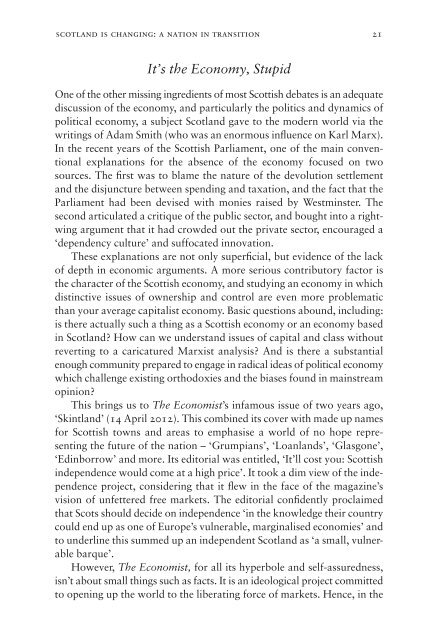Caledonian Dreaming by Gerry Hassan sampler
Caledonian Dreaming: The Quest for a Different Scotland offers a penetrating and original way forward for Scotland beyond the current independence debate. It identifies the myths of modern Scotland, describes what they say and why they need to be seen as myths. Hassan argues that Scotland is already changing, as traditional institutions and power decline and new forces emerge. He outlines a prospectus for Scotland to become more democratic and to embrace radical and far-reaching change.
Caledonian Dreaming: The Quest for a Different Scotland offers a penetrating and original way forward for Scotland beyond the current independence debate. It identifies the myths of modern Scotland, describes what they say and why they need to be seen as myths.
Hassan argues that Scotland is already changing, as traditional institutions and power decline and new forces emerge. He outlines a prospectus for Scotland to become more democratic and to embrace radical and far-reaching change.
You also want an ePaper? Increase the reach of your titles
YUMPU automatically turns print PDFs into web optimized ePapers that Google loves.
scotland is changing: a nation in transition 21<br />
It’s the Economy, Stupid<br />
One of the other missing ingredients of most Scottish debates is an ade quate<br />
discussion of the economy, and particularly the politics and dynamics of<br />
political economy, a subject Scotland gave to the modern world via the<br />
writings of Adam Smith (who was an enormous influence on Karl Marx).<br />
In the recent years of the Scottish Parliament, one of the main conventional<br />
explanations for the absence of the economy focused on two<br />
sources. The first was to blame the nature of the devolution settlement<br />
and the disjuncture between spending and taxation, and the fact that the<br />
Parliament had been devised with monies raised <strong>by</strong> Westminster. The<br />
second articulated a critique of the public sector, and bought into a rightwing<br />
argument that it had crowded out the private sector, encouraged a<br />
‘dependency culture’ and suffocated innovation.<br />
These explanations are not only superficial, but evidence of the lack<br />
of depth in economic arguments. A more serious contributory factor is<br />
the character of the Scottish economy, and studying an economy in which<br />
distinctive issues of ownership and control are even more problematic<br />
than your average capitalist economy. Basic questions abound, including:<br />
is there actually such a thing as a Scottish economy or an economy based<br />
in Scotland? How can we understand issues of capital and class without<br />
reverting to a caricatured Marxist analysis? And is there a substantial<br />
enough community prepared to engage in radical ideas of political economy<br />
which challenge existing orthodoxies and the biases found in mainstream<br />
opinion?<br />
This brings us to The Economist’s infamous issue of two years ago,<br />
‘Skintland’ (14 April 2012). This combined its cover with made up names<br />
for Scottish towns and areas to emphasise a world of no hope representing<br />
the future of the nation – ‘Grumpians’, ‘Loanlands’, ‘Glasgone’,<br />
‘Edinborrow’ and more. Its editorial was entitled, ‘It’ll cost you: Scottish<br />
independence would come at a high price’. It took a dim view of the independence<br />
project, considering that it flew in the face of the magazine’s<br />
vision of unfettered free markets. The editorial confidently proclaimed<br />
that Scots should decide on independence ‘in the knowledge their country<br />
could end up as one of Europe’s vulnerable, marginalised economies’ and<br />
to underline this summed up an independent Scotland as ‘a small, vulnerable<br />
barque’.<br />
However, The Economist, for all its hyperbole and self-assuredness,<br />
isn’t about small things such as facts. It is an ideological project committed<br />
to opening up the world to the liberating force of markets. Hence, in the


















